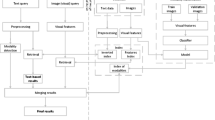Abstract
A relevance feedback (RF) approach for content-based image retrieval (CBIR) is proposed, which is based on Support Vector Machines (SVMs) and uses a feature selection technique to reduce the dimensionality of the image feature space. Specifically, each image is described by a multidimensional vector combining color, texture and shape information. In each RF round, the positive and negative examples provided by the user are used to determine a relatively small number of the most important features for the corresponding classification task, via a feature selection methodology. After the feature selection has been performed, an SVM classifier is trained to distinguish between relevant and irrelevant images according to the preferences of the user, using the restriction of the user examples on the set of selected features. The trained classifier is subsequently used to provide an updated ranking of the database images represented in the space of the selected features. Numerical experiments are presented that demonstrate the merits of the proposed relevance feedback methodology.
Preview
Unable to display preview. Download preview PDF.
Similar content being viewed by others
References
Datta, R., Li, J., Wang, J.Z.: Content-Based Image Retrieval: Approaches and Trends of the New Age. Multimedia Information Retrieval, 253–262 (2005)
Guo, G.D., Jain, A.K., Ma, W.Y., Zhang, H.J.: Learning Similarity Measure for Natural Image Retrieval with Relevance Feedback. IEEE Trans. Neural Netw. 13(4), 811–820 (2002)
Jing, F., Li, M., Zhang, H.-J., Zhang, B.: Relevance Feedback in Region-Based Image Retrieval. IEEE Trans. Circuits Syst. Video Technol. 14(5), 672–681 (2004)
Tong, S., Chang, E.: Support Vector Machine Active Learning for Image Retrieval. ACM Multimedia, 107–118 (2001)
Hsu, C.T., Li, C.Y.: Relevance Feedback Using Generalized Bayesian Framework with Region-Based Optimization Learning. IEEE Trans. Image Process. 14(10), 1617–1631 (2005)
Marakakis, A., Galatsanos, N., Likas, A., Stafylopatis, A.: Probabilistic Relevance Feedback Approach for Content-Based Image Retrieval Based on Gaussian Mixture Models. IET Image Process. 3(1), 10–25 (2009)
Guyon, I., Weston, J., Barnhill, S., Vapnik, V.: Gene Selection for Cancer Classification Using Support Vector Machines. Machine Learning 46, 389–422 (2002)
Peng, H., Long, F., Ding, C.: Feature Selection Based on Mutual Information: Criteria of Max-Dependency, Max-Relevance, and Min-Redundancy. IEEE Trans. Pattern Anal. Mach. Intell. 27(8), 1226–1238 (2005)
Wang, L.: Feature Selection with Kernel Class Separability. IEEE Trans. Pattern Anal. Mach. Intell. 30(9), 1534–1546 (2008)
Chang, T., Kuo, C.-C.J.: Texture Analysis and Classification with Tree-Structured Wavelet Transform. IEEE Trans. Image Process. 2(4), 429–441 (1993)
Won, C.S., Park, D.K., Park, S.-J.: Efficient Use of MPEG-7 Edge Histogram Descriptor. ETRI Journal 24(1), 23–30 (2002)
Bishop, C.M.: Pattern Recognition and Machine Learning. Springer, Heidelberg (2006)
Microsoft Research Cambridge Object Recognition Image Database, version 1.0, http://research.microsoft.com/research/downloads/Details/b94de342-60dc-45d0-830b-9f6eff91b301/Details.aspx
LIBSVM – A Library for Support Vector Machines, http://www.csie.ntu.edu.tw/~cjlin/libsvm/
mRMR Feature Selection Site, http://research.janelia.org/peng/proj/mRMR/
Author information
Authors and Affiliations
Editor information
Editors and Affiliations
Rights and permissions
Copyright information
© 2009 Springer-Verlag Berlin Heidelberg
About this paper
Cite this paper
Marakakis, A., Galatsanos, N., Likas, A., Stafylopatis, A. (2009). Relevance Feedback for Content-Based Image Retrieval Using Support Vector Machines and Feature Selection. In: Alippi, C., Polycarpou, M., Panayiotou, C., Ellinas, G. (eds) Artificial Neural Networks – ICANN 2009. ICANN 2009. Lecture Notes in Computer Science, vol 5768. Springer, Berlin, Heidelberg. https://doi.org/10.1007/978-3-642-04274-4_97
Download citation
DOI: https://doi.org/10.1007/978-3-642-04274-4_97
Publisher Name: Springer, Berlin, Heidelberg
Print ISBN: 978-3-642-04273-7
Online ISBN: 978-3-642-04274-4
eBook Packages: Computer ScienceComputer Science (R0)




